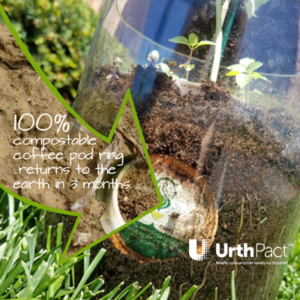 In honor of International Compost Awareness Week this week we’re going to focus on compostable plastic – what it is, what it can be used for, and how it can benefit the environment.
In honor of International Compost Awareness Week this week we’re going to focus on compostable plastic – what it is, what it can be used for, and how it can benefit the environment.
Because being “green” and “organic” are seen as positive attributes for a long list of products and services, these terms have been adopted by marketers and muddied to such an extent that it can be difficult to truly understand what really is earth-friendly. The term “compostable” falls into this category, so we’re going to help clarify things in this post.
Compostable plastic has been defined by ASTM International standards D6400 and D6868. These global standards require that for plastics to be labeled “compostable” they must biodegrade within a certain period of time and leave no toxic residue in the soil. Plastic that is compostable is a bioproduct manufactured from renewable resources such as plant-based materials.
Specifically, ASTM Standard D6400 covers plastics and products made from plastics that are designed to be composted in municipal and industrial aerobic composting facilities. This specification is intended to establish the requirements for labeling of materials and products, including packaging made from plastics, as “compostable in municipal and industrial composting facilities.”
The properties in this specification help determine if plastics and products made from them will compost satisfactorily, including biodegrading at a rate comparable to known compostable materials, and to assure that their degradation will not diminish the value or utility of the compost resulting from the composting process.
ASTM Standard D6868 covers biodegradable plastics and products (including packaging), where plastic films or sheets are attached to substrates through either lamination or extrusion directly onto the paper and the entire product or package is designed to be composted.
This specification is similar to D6400 in that it is written to establish labeling requirements for plastic materials, products, and packaging as “compostable in municipal and industrial composting facilities,” but also covers coatings of biodegradable plastics. It, too, contains plastic properties required to assure proper degradation in the composting process.
Let’s take a closer look at the specific definitions of terms associated with compostable plastic, as set forth by ASTM International:
Biodegradable plastic: a degradable plastic in which the degradation results from the action of naturally occurring microorganisms such as bacteria, fungi, and algae.
Compostable plastic: a plastic that undergoes degradation by biological processes during composting to yield CO2, water, inorganic compounds, and biomass at a rate consistent with other known compostable materials and leave no visible, distinguishable, or toxic residue.
We should note that the broad category of bioplastics includes two sub-categories:
Bio-based plastics which are made from carbon-based raw material that are partly or entirely renewable biogenic carbon and replaces traditional, non-renewable petroleum-based carbon.
Biocomposite plastics that combine renewable plant-based raw materials with traditional petroleum-based ingredients.
What makes compostable plastics so attractive is that once products manufactured from compostable bioplastics have reached the end of their lifecycles they can compost in as little as three months. Compare that to non-sustainable, petroleum-based plastics, which can take 500 years to decompose.
Food service and packaging products: ideal for compostable bioplastics
At UrthPact, we make compostable plastic from microbial fermentation or the polymerization of natural and refined sugars and starches. Raw materials such as canola seeds and cane sugar are converted to plastic through a natural process that does not harm the environment and yields products that degrade quickly through composting. That means everyday products such as cutlery and single-use coffee pods can be used both for convenience and for the good of the earth. After use, they can be easily composted and turned into biomass that becomes useful soil for crops that, in turn, can be used to make more products as well as food to feed the planet’s growing population.
Isn’t it time you made the switch to sustainable, plant-based, compostable bioplastic products for your business?
Contact UrthPact today to learn more about converting your plastic parts into earth-friendly bioplastic.



